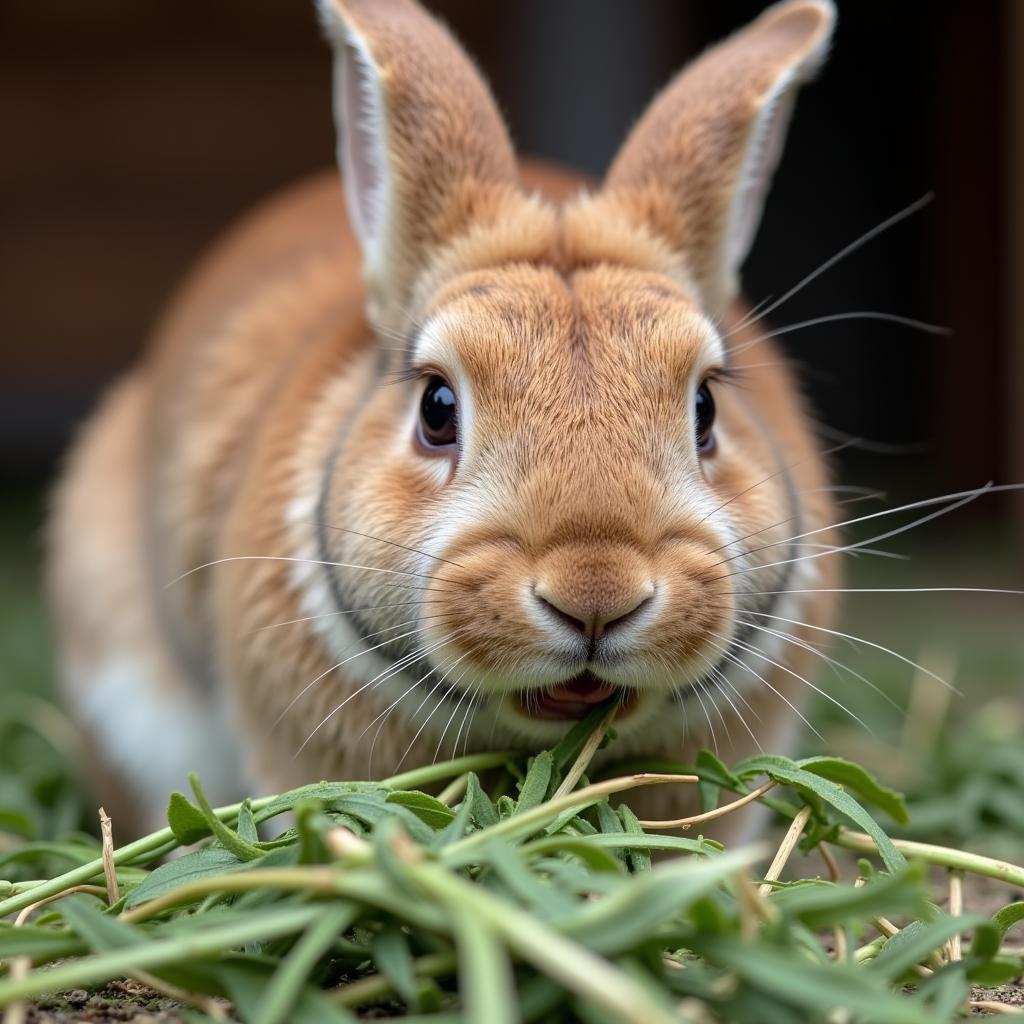Full Cheeks Rabbit Food signifies a happy, healthy bunny. But what exactly does it take to achieve those adorable chubby cheeks and ensure your rabbit is thriving? This comprehensive guide delves into the essentials of rabbit nutrition, covering everything from hay to treats, to help you keep your long-eared friend in tip-top shape.
The Hay is the Way: The Foundation of a Healthy Diet
Hay is the cornerstone of any rabbit’s diet. It provides essential fiber for digestive health, helps wear down their constantly growing teeth, and keeps them entertained. Timothy hay is a popular choice for adult rabbits, while alfalfa hay, with its higher calcium content, is better suited for growing bunnies and nursing mothers. Offer your rabbit an unlimited supply of fresh, high-quality hay every day. Avoid hay that appears dusty, moldy, or has an unpleasant odor.
Providing the right type and amount of hay is crucial for preventing gastrointestinal stasis, a serious condition that can be fatal in rabbits. Fiber keeps their digestive system moving smoothly, and without enough of it, things can quickly go downhill.
 Rabbit Enjoying Timothy Hay
Rabbit Enjoying Timothy Hay
Pellets: A Supplementary Source of Nutrients
While hay forms the bulk of a rabbit’s diet, pellets offer a concentrated source of vitamins and minerals. Choose high-fiber pellets specifically formulated for rabbits. Avoid muesli-style mixes, as rabbits tend to selectively eat the tastier bits, leading to nutritional imbalances. Offer a measured amount of pellets daily, adjusting the portion based on your rabbit’s age, size, and activity level.
Too many pellets can lead to obesity and other health problems, so it’s important to stick to the recommended feeding guidelines.
Fresh Greens: Adding Variety and Vitamins
Leafy greens provide a welcome addition to a rabbit’s diet, offering a boost of vitamins and hydration. Safe options include romaine lettuce, kale, parsley, and cilantro. Introduce new greens gradually to avoid digestive upset. Wash all greens thoroughly to remove any pesticides or contaminants.
Variety is key when it comes to greens. Just like humans, rabbits can get bored with the same old thing!
Treats: A Little Goes a Long Way
Treats should be given sparingly. Small pieces of fruit, like apple or banana, can be offered occasionally, but remember that these are high in sugar. Commercial rabbit treats are available, but choose those with natural ingredients and limited added sugars.
Remember, moderation is key when it comes to treats. Too many can lead to weight gain and digestive issues.
What About Water?
Fresh, clean water should always be available to your rabbit. A heavy ceramic bowl is ideal, as it’s less likely to be tipped over. You can also use a sipper bottle, but ensure your rabbit is comfortable using it and that it’s regularly cleaned to prevent bacterial growth.
Dr. Amelia Harper, a veterinarian specializing in exotic animal care, emphasizes the importance of hydration: “Water is essential for all bodily functions, including digestion and temperature regulation. Make sure your rabbit always has access to fresh water.”
Full Cheeks Rabbit Food: Signs of a Healthy Diet
How do you know if your rabbit’s diet is on point? Look for these signs:
- Bright eyes and a shiny coat: These are indicators of overall good health.
- Healthy appetite and regular bowel movements: A rabbit with a good appetite and consistent droppings is a happy rabbit.
- Active and playful behavior: A healthy rabbit will be energetic and engaged with its surroundings.
- Full cheeks: As the name suggests, those adorable chubby cheeks are a sign of a well-nourished bunny!
Conclusion
Achieving those desirable full cheeks rabbit food requires a balanced diet rich in hay, supplemented with pellets, fresh greens, and the occasional treat. By following these guidelines and paying attention to your rabbit’s individual needs, you can ensure your furry friend enjoys a long, healthy, and happy life. Remember, a well-nourished rabbit is a happy rabbit!
FAQ
- What kind of hay is best for my rabbit? Timothy hay is a great choice for adult rabbits.
- Can rabbits eat carrots? Yes, but in moderation as they are high in sugar.
- How much should I feed my rabbit? It depends on age and size, but unlimited hay is essential.
- What are the signs of a healthy rabbit? Bright eyes, shiny coat, healthy appetite, and active behavior.
- How often should I clean my rabbit’s water bottle? Daily is ideal to prevent bacterial growth.
- What should I do if my rabbit stops eating? Consult a veterinarian immediately, as this could be a sign of a serious health issue.
- Can rabbits eat iceberg lettuce? No, iceberg lettuce has little nutritional value and can cause digestive problems.
Need further assistance? Contact us at Phone Number: 02437655121, Email: minacones@gmail.com or visit us at 3PGH+8R9, ĐT70A, thôn Trung, Bắc Từ Liêm, Hà Nội, Việt Nam. We have a 24/7 customer service team ready to help.